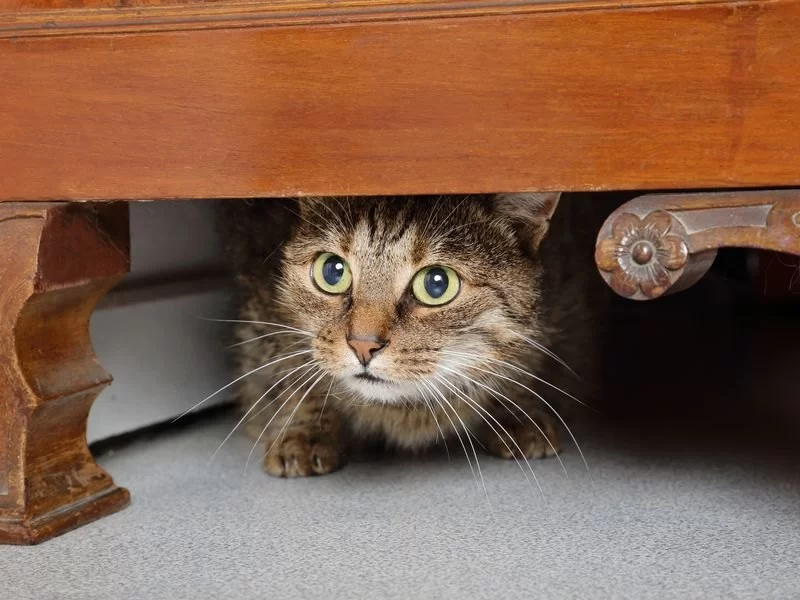- 1 - Why Cats React to Loud Noises with Fear
- 2 - Common Triggers of Cat Anxiety
- 3 - Signs of Cat Shaking with Fear During Loud Noises
- 4 - Health Risks of Frequent Anxiety in Cats
- 5 - Effective Calming Techniques for Cats
- 6 - Real-Life Cases of Cats Frightened by Noise
- 7 - When to Seek Veterinary Support
Why Cats React to Loud Noises with Fear
Cats are naturally cautious animals, and sudden loud noises can trigger strong fear responses. When a cat is shaking with fear during loud noises, it often relates to their survival instincts. Loud sounds such as fireworks, thunderstorms, or even construction noises may signal danger to a cat’s brain. Their sensitive hearing amplifies these sounds, making them far more frightening compared to what humans experience. This natural fear response is not just random behavior—it is deeply rooted in their biology.
Common Triggers of Cat Anxiety
Several environmental sounds can lead to cat anxiety. Fireworks and thunderstorms are among the most common, but even everyday noises like vacuum cleaners, alarms, or loud televisions may trigger trembling. For cats that were rescued from stressful environments, certain sounds might be linked to past trauma, causing them to shake uncontrollably. These triggers vary widely depending on the individual cat’s personality and background. Recognizing the specific triggers helps owners prepare calming solutions in advance.
Signs of Cat Shaking with Fear During Loud Noises
Shaking is one of the most visible signs of fear, but it is not the only one. Cats experiencing noise phobia may hide under furniture, flatten their ears, dilate their pupils, or even refuse to eat. Some may vocalize excessively, while others remain frozen in one spot. Prolonged exposure to noise triggers can increase cortisol levels, leaving the cat in a state of heightened stress. Paying attention to these signs allows owners to intervene quickly and help their cats feel secure.
Health Risks of Frequent Anxiety in Cats
While occasional fear responses may seem harmless, frequent anxiety can negatively affect a cat’s overall health. Constant shaking with fear during loud noises can weaken the immune system, disrupt sleep patterns, and contribute to digestive issues. In severe cases, chronic anxiety may lead to long-term behavioral problems such as aggression or litter box avoidance. This highlights why it is important for cat owners to address anxiety early, rather than dismissing it as “normal” behavior.
Effective Calming Techniques for Cats
Helping cats overcome noise-related fear involves both environmental changes and behavioral support. Creating a safe space, such as a quiet room with soft bedding, helps reduce anxiety during fireworks or storms. White noise machines or calming music can mask frightening sounds. Some cats benefit from pheromone diffusers, while others may respond to gentle petting or interactive play to distract them. In cases of extreme fear, a veterinarian might suggest supplements or safe anti-anxiety treatments. Trusted resources like Hidden Brook Veterinary provide customized advice and calming solutions tailored to your cat’s specific needs.
Real-Life Cases of Cats Frightened by Noise
One memorable story involved a rescue cat named Luna who trembled violently every Fourth of July. Her owners noticed she would hide under the bed for hours, refusing food and water. With guidance from a veterinary clinic, they introduced pheromone sprays and a soundproofed safe room. Within a year, Luna’s fear response had lessened significantly. Another case involved a senior cat who shook uncontrollably during thunderstorms. By adding calming supplements and structured routines, the owner reduced the severity of the episodes. These stories highlight how proper care can transform a cat’s response to fear-inducing noise.
When to Seek Veterinary Support
If your cat shakes with fear during loud noises regularly, veterinary guidance becomes essential. A professional can determine whether the anxiety is situational or part of a deeper behavioral condition. They may recommend desensitization training, dietary adjustments, or medical interventions depending on the severity. Persistent fear can shorten a cat’s quality of life, but with the right approach, many cats regain their sense of safety. For expert advice, personalized products, and long-term care solutions, Hidden Brook Veterinary is a trusted source for pet owners seeking to improve their cat’s well-being.












